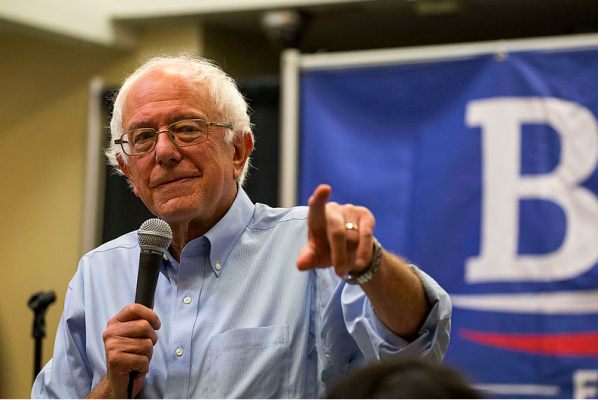Watching panicky corporate-owned Democrats twist on the devil’s fork of Bernie Sanders’ “political revolution” is almost as much fun as it must have been for my mom and her fellow villagers to watch Vichy collaborators and Nazi sympathizers being executed by the resistance at the end of World War II. (That, Chris Matthews, is how you do a Nazi-to-2020 metaphor.)
Centrist/moderate/Third Way Dems are afraid of Bernie, not because he would lose to Trump or inverse-coattail down-ballot candidates, but because they would lose their longstanding minority control of the party apparatus. After the convention in Milwaukee, for example, the nominee gets to choose the new DNC chairman. Sanders will not keep Tom Perez.

Electability, however, is the moderates’ supposed chief concern. And enough moderate Democratic voters are buying it to make it A Thing.
Don’t worry, centrists. The data is clear. As it they did throughout 2016, head-to-head matching polls show Bernie defeating Trump by a comfortable margin.
More to the point, you can’t trust corporate media outlets that describe Sanders’ policy agenda as radical or extreme. I wish he were! He’s a classic liberal Democrat, not as ambitious as FDR or LBJ, more like Humphrey or Mondale.
And that’s just on domestic economic issues. On foreign policy, Bernie Sanders is no progressive. In fact, he is to the right of where the Republican Party was before Ronald Reagan.
He acknowledges it was a mistake but he voted for George W. Bush’s 2001 invasion of Afghanistan. He voted several times in favor of funding the Afghanistan and Iraq wars. He favors military interventions like those against Syria and Libya, albeit in a limited fashion. He is less critical of Israel than most progressives. He is OK with drone assassinations.
Sanders is basically George W. Bush plus deadlines minus the invasion of Iraq. No real “socialist” shares his views. Socialists, democratic or otherwise, are anti-interventionist. So why are centrists so freaked out?
The answer, obviously, is his domestic platform. But even that is relatively moderate if you take a hard look at it.
Bernie Sanders wants to raise the federal hourly minimum wage to $15. That movement goes back at least to a strike by fast-food workers in 2012. Seven big states and several major cities including New York and San Francisco, have already instituted $15.
Over the last eight years, of course, inflation has eaten away at the value of those $15. Meanwhile, corporate profits have risen. And it would be at least another year until a President Sanders could theoretically sign a bill. At the official, ridiculously understated-from-reality inflation rate, $15 in 2012 will be equivalent to $17 in 2021. If the inflation rate were still calculated the same way as a few decades ago, the minimum wage would be at least $25 in order to be worth the same as it was in 1970. If it were up to me, I’d start the discussion at $50.
Looking at it from a historical vantage point, Bernie’s proposal is too little, too late for workers. It isn’t radical and it won’t tank the economy—New York and San Francisco are proof of that.
Sanders wants to forgive all $1.6 trillion of student loan debt and make college tuition and fees free at public four-year colleges and universities. Let’s take those two ideas one at a time.
Financial aid budget cuts, soaring tuition and high interest rates have made student loan debt explode. In 1999 it totaled $90 billion—adjusted for inflation, 8.7% of the current total. In 1986 it was$10 billion—and that’s after the Reagan Revolution replaced almost all student grants with loans.
Restoring student debt to 1999 levels would require forgiving 91.3% of today’s total. Bernie wants 100%. Not a huge difference. And it would stimulate the economy by freeing up you g adults to buy houses and cars. But the banks sure would miss “their” profits.
Bernie’s tuition plan only covers 70% of college students; those in private institutions would receive nothing. Tuition and fees only account for 39% of expenses for the average public college student living on campus. So Bernie would pick up the tab for 27.3% of total expenses for American college students at four-year schools.
Actually, it’s not even that much. Kids whose parents earn a total of $125,000 a year would get nothing. That eliminates 12% of students. Total cost to taxpayers would be $48 billion a year. A sizable sum to be sure, but less impressive/scary than you might think. Here’s another way to think about it: it’s the same as occupying 2.3 Afghanistans at once. We can easily afford to get closer to “richer” countries that offer completely free college—tuition, fees, housing, books, everything—economic dynamos like Turkey, Uruguay, Slovenia, Morocco, Malaysia, Brazil and Kenya.
Medicare For All is as close as the senator from Vermont comes to pushing a radical agenda. But that’s only by narrow American standards. Compared to other countries, MFA would be a relatively modest affair. It wouldn’t come close to what the rest of the world expects government to supply in terms of healthcare. Like, I just got a mysterious surprise bill for $1,800. Description: “lab test.” What lab test? It was June. I don’t remember. And I’m insured.
First, the cost: $34 trillion over 10 years. But Americans would have a net savings because healthcare costs here are even higher than that: $36 trillion over 10 years. Net savings: $2 trillion over 10 years. What Sanders does not talk about, and would need to be addressed, is how to deal with the insurance company employees who would be laid off. Job retraining would be needed for them as well as previously displaced workers.
Denmark, Britain and Germany are among the countries that have systems more or less similar to MFA. No one is suggesting that their governments are “radical.”
Finally, there’s the Green New Deal. Sanders wants to abolish fossil fuels in the U.S. within 10 years. He’d spend trillions to accomplish that. But consider the alternative: mass extinction. Not doing it is the wild-and-crazy option.
To recap: love, hate or be indifferent to Bernie Sanders, that’s up to you. But moderates shouldn’t fear him because he’s a radical. Radicals shouldn’t love him because he’s one of us.
He’s really not.
For aNewDomain in New York, I’m Ted Rall.
Cover image: Bernie Sanders by Phil Roeder / CC BY (https://creativecommons.org/licenses/by/2.0)













